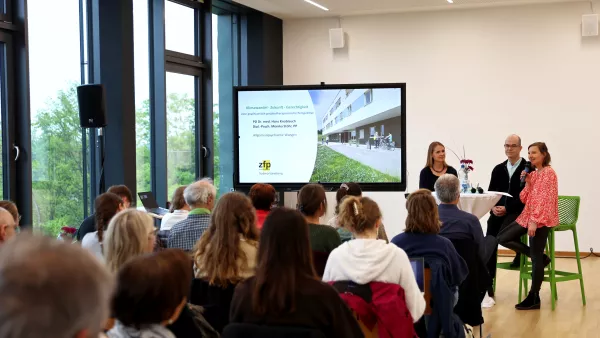
In the last "Early Night Social Talk", the speakers dealt intensively with the connection between climate change and the human psyche. Dr. Hans Knoblauch and psychologist Monika Stöhr from the Zentrum für Psychiatrie Südwürttemberg (ZfP) were invited.
In the first lecture of the evening, Monika Stöhr began by explaining the various real dimensions of climate change. For example, the social impact of the climate crisis should also be seen as a health crisis. The psychological consequences in particular, such as trauma disorders and depression triggered by climate change, have long been observed. However, the psychological consequences can also be felt on a smaller scale. The term "solastalgia", for example, describes the circumstance when the change in one's own home leads to stress.
Following her presentation, Monika Stöhr and RWU Psychology-Professor Dr. Anna-Sophia Schwind demonstrated a so-called "climate consultation". This is a service that has been available at the Center for Psychiatry at the ZfP in Wangen for several years. Among other things, people can come in for an initial consultation to talk about their thoughts, feelings and fears regarding climate change. The aim is to work on existing cognitive dissonance with a systemic solution orientation and to focus on a future with possibilities.
"There is hope, we can do something!"
"Climate emotions" do not necessarily have to be negative. Hope can become an elementary component of the fight against climate change. "Nevertheless, negative psychological mindsets are on the rise in this context," said Hans Knoblauch in the second lecture of the evening. In one of his case studies, a patient in an acute phase of depression developed an apocalyptic delusion - in which the Allgäu region had already mutated into a Sahel zone.
Hans Knoblauch also described the various "climate injustices" to which too little attention is paid. Extreme weather events are often described as "natural disasters", but usually have a social context and are influenced by the actions of human actors. In addition, a so-called "central reduction" occurs when climate change is reduced to just one factor, such as CO2 emissions. "This not only limits the discussion about the climate, but also excludes possible options for action in relation to climate change," says the Medical Director of the Department of General Psychiatry and Psychotherapy in Wangen.
In 2021, the first medical diagnosis of "climate change" was made in Canada in connection with the heatwave there, the forest fires and the associated particulate matter pollution. In British Columbia, people who already suffered from schizophrenia were the most vulnerable group and accounted for many deaths. People with mental illness are therefore also among the most vulnerable risk groups for heatwaves.
But even apart from mental illnesses, an increase in aggression can be observed during heatwaves and a connection between the psyche and climate can be recognized, according to Hans Knoblauch. Options for action and a feeling of paralysis are then often very close together. The lecture led to questions such as: "How sustainable are our society and its individuals in relation to climate change? How sustainable is our economy?" This and other questions were then discussed intensively between the audience and the panel.

Text/Photos: Alec Weber